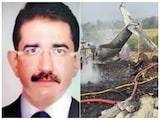Israel's sustained strikes on Iran may have focused on nuclear facilities, but no one is fooled. The timing, precision and messaging suggest something far bigger is at play. Israeli Prime Minister Benjamin Netanyahu isn't just trying to delay or dismantle Iran's nuclear programme, he is openly flirting with a broader, riskier ambition: regime change.
He has said it plainly. The war with Iran, he said, “could certainly” end with the Islamic Republic's collapse. This statement could be interpreted this way: dismantle the nuclear threat, and if the regime falls along the way, so be it, maybe even better.
And that brings us to the more shadowy side of the story.
Multiple sources suggest, corroborated by US President Donald Trump himself, that Israeli intelligence had been planning a high-level assassination, with less than Iran's Supreme Leader Ayatollah Ali Khamenei being on the target list. But the operation, reportedly floated to the US president, never got a green light. Trump, who had earlier authorised the killing of General Qassem Soleimani, seemed to think that killing a sitting head of state was a step too far.
Times Are Changing
Trump has shifted gears. After days of playing it cool, he has begun speaking in ominous tones. Iran must surrender, he warns, or face consequences. He refers to Netanyahu and Israel as “we” and says the Ayatollah is “in our sights” - a chilling phrase that blurs the line between deterrence and a death threat. The US media has reported that he has already approved an attack plan for Iran, although the details are not clear yet.
But there's a catch. Trump's own political instincts are at war with his geopolitical urges. His MAGA (‘Make America Great Again') base, fiercely anti-interventionist and scarred by Iraq and Afghanistan - has no appetite for another foreign adventure. “America First” wasn't just a slogan; it was a barricade against exactly this kind of entanglement.
And it is not just the grassroots pushing back. Eight US senators, including voices from both sides of the aisle, have tabled legislation urging the administration to stay out of any Israeli-initiated war with Iran. The message is loud and clear: “This fight isn't ours”.
But with missiles flying, rhetoric escalating, and history repeating itself, the question becomes urgent: whose fight is this really, and where does it end?
Whose Fight Is It?
Bombs and missiles began raining down on Iran last Friday. Israeli jets, in a series of carefully calibrated airstrikes, have repeatedly been striking sites reportedly linked to Iran's nuclear programme. Israel says it wants to prevent Iran from acquiring nuclear weapons for its own security. Netanyahu is now openly calling for regime change in Tehran. "The Iranian regime must go," he said, a rare direct statement from the leader of a nation that has long seen Iran as its most pressing regional threat.
But such clarity of purpose brings a troubling sense of déjà vu. Because we have been here before: in Iraq, in Libya, in Afghanistan. And the results were hardly the democracy or stability promised at the outset.
An Uneven Nuclear Logic
Let us first acknowledge a striking contradiction. The state now pushing the hardest to bomb Iran before it develops nuclear weapons is, by all credible estimates, the only nuclear-armed power in the Middle East. Israel possesses between 80 and 200 nuclear warheads. It has never signed the Nuclear Non-Proliferation Treaty (NPT), never allowed UN inspectors into its Dimona facility, and has faced no meaningful international sanctions or scrutiny.
Iran, by contrast, is a signatory to the NPT. It has endured years of International Atomic Energy Agency (IAEA) inspections and, at least for a time, agreed to the terms of the 2015 nuclear deal, which significantly curbed its enrichment activities
This is not global order, but global theatre. It's like being lectured on sobriety by someone hiding a whisky bottle behind his back.
A Leader Under Pressure
Netanyahu has been a consistent voice warning of the dangers posed by the Iranian regime. His concerns aren't without basis. Iran has backed and nurtured groups like Hezbollah and Hamas and has used its influence in Iraq, Syria and Yemen to project regional power. Israeli security concerns are real and deeply rooted.
Yet, Netanyahu himself is facing significant political turbulence at home. His judicial overhaul plans have triggered one of the largest protest movements in Israel's history. He also faces ongoing legal challenges over corruption allegations. Some critics say his hardline stance on Gaza and Iran is partly aimed at rallying his base and reasserting leadership through foreign policy.
This does not mean Israel's security concerns aren't genuine. But it raises the question: should the fate of nearly 90 million Iranians hinge on the political calculus of another country's leader?
The Ghost of Mossadegh
The idea of toppling Iran's regime is not new. In 1953, Iran's democratically elected Prime Minister, Mohammad Mossadegh, was overthrown in a coup backed by America's Central Intelligence Agency (CIA) and the UK's MI6, after he moved to nationalise Iran's oil. The West reinstalled the Shah, whose authoritarian regime ruled for 26 years before the Islamic Revolution of 1979.
This history matters. It left deep scars on the Iranian psyche and framed the Islamic Republic's distrust of Western powers. Any new foreign intervention, especially one aimed at removing its government, will almost certainly be seen through that same lens.
The Wreckage of Foreign 'Intervention'
We know what an externally driven regime change looks like. We saw it in Iraq: a dictator removed, but what followed was a brutal sectarian conflict and the rise of ISIS. In Libya, the fall of Gaddafi unleashed chaos, civil war, and the emergence of modern-day slave markets. Even Afghanistan, where the West had a two-decade project of state-building, collapsed overnight as the Taliban returned to power in 2021.
The images of desperate Afghans clinging to US planes as they departed Kabul will haunt American foreign policy for decades. It was a tragic reminder that foreign boots on the ground, no matter how well-intentioned, cannot engineer legitimacy.
Iran Is Not Anyone's Experiment
Iran is not Libya. It's not Iraq. It's not a failed state or an empty shell. It's a proud, complex nation with a rich history and a vibrant, even if suppressed, civil society. Iranian women, students and reformers have repeatedly taken to streets to demand change - from the Green Movement in 2009 to the "Woman, Life, Freedom" protests after Mahsa Amini's death in 2022.
That struggle is theirs, and only theirs. To hijack it with foreign bombs is to weaken it.
Trump, MAGA, And The American Dilemma
Trump has long harboured hawkish views on Iran. He withdrew from the nuclear deal in 2018, ramped up sanctions and authorised the killing of Qassem Soleimani. As Israel increases its military pressure on Tehran, Trump may again be tempted to support a harder line. But his core political base - MAGA Republicans - are deeply isolationist. As stated above, they have no appetite for new wars. Burned by the quagmires of Iraq and Afghanistan, they see foreign interventions as elite adventurism. For Trump, openly backing Israeli strikes or regime change in Iran risks alienating the very voters who propelled him to power. “America First” was not just a campaign slogan. It was a rejection of the costly interventions that defined the post-9/11 era.
Whose Mandate, Exactly?
If regime change in Iran is the goal, who has the mandate to enforce it? Not the UN. Not the Arab League. Not even NATO. And certainly not Israel acting unilaterally. Israel has legitimate security concerns, but imposing regime change on a sovereign nation is a vastly different proposition. It assumes that what follows will be better - but offers no blueprint for what that "better" looks like, or who would lead it.
What if the fall of the Islamic Republic triggers civil war, or empowers even more hardline elements? What if it collapses the country into regional proxy warfare that pulls in Iraq, Lebanon and Syria?
Support, Don't Steer
There are ways to support change in Iran without dictating it. The international community can amplify Iranian voices, support internet freedom, provide safe haven for dissidents and apply targeted sanctions on human rights abusers.
But bombing Iran into democracy is a fantasy. Worse, it risks entrenching the very regime it seeks to remove. Nationalist sentiment in Iran often rises in the face of foreign aggression. Military strikes will likely rally public support around the government, not weaken it. We have already seen protests in support of the current regime in the last few days.
A Domino Effect
Iran's strategic alliances run deep. It supports Hezbollah in Lebanon, militias in Iraq, proxies in Syria and the Houthis in Yemen. Any military campaign against Tehran risks igniting fires across the region. Tel Aviv may launch the first strike, but it may not be able to control what happens next.
Israel's call for regime change may resonate in Washington, but even American analysts warn of the cascading risks. Europe, already grappling with war in Ukraine and political instability at home, is hardly in a position to absorb another Middle Eastern crisis.
Let Iranians Lead
Iran's Mullah regime is deeply flawed. It is repressive, unaccountable and resistant to internal reform. But it is also an Iranian problem, not an Israeli or American one.
The path to a freer Iran does not run through war rooms in Tel Aviv or Washington. It runs through Iranian streets, campuses, courtrooms, and, eventually, polling booths. That process is long, frustrating and often heartbreaking. But it is the only path that leads to legitimacy.
Netanyahu may believe he is protecting Israel. Trump may believe he is projecting American strength. But unless they also believe in the dignity of people to shape their own future, they risk repeating history's worst mistakes.
Iran's future must be written in Persian, not in Hebrew or English. And it certainly must not be imposed in the language of war.
(Syed Zubair Ahmed is a London-based senior Indian journalist with three decades of experience with the Western media)
Disclaimer: These are the personal opinions of the author















